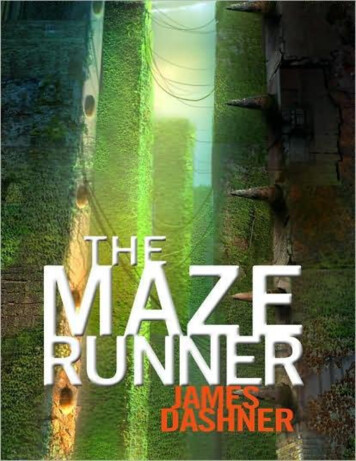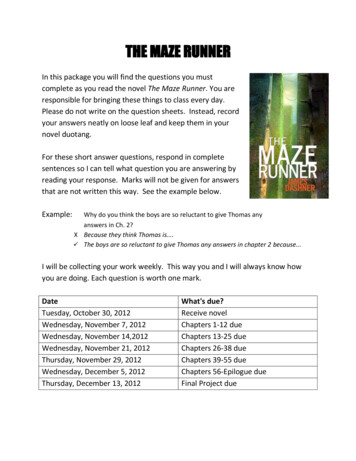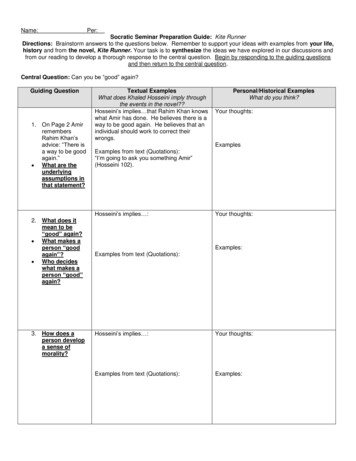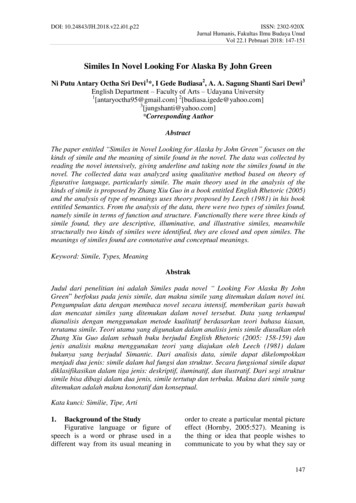
Transcription
ALSO BY JAMES DASHNERThe 13th Reality seriesThe Journal of Curious LettersThe Hunt for Dark Infinity
For Lynette. This book was a three-year journey,and you never doubted.
CHAPTER 1He began his new life standing up, surrounded by cold darkness and stale, dusty air.Metal ground against metal; a lurching shudder shook the floor beneath him. He fell down at the suddenmovement and shuffled backward on his hands and feet, drops of sweat beading on his forehead despitethe cool air. His back struck a hard metal wall; he slid along it until he hit the corner of the room. Sinkingto the floor, he pulled his legs up tight against his body, hoping his eyes would soon adjust to thedarkness.With another jolt, the room jerked upward like an old lift in a mine shaft.Harsh sounds of chains and pulleys, like the workings of an ancient steel factory, echoed through theroom, bouncing off the walls with a hollow, tinny whine. The lightless elevator swayed back and forth asit ascended, turning the boy’s stomach sour with nausea; a smell like burnt oil invaded his senses, makinghim feel worse. He wanted to cry, but no tears came; he could only sit there, alone, waiting.My name is Thomas, he thought.That that was the only thing he could remember about his life.He didn’t understand how this could be possible. His mind functioned without flaw, trying to calculatehis surroundings and predicament. Knowledge flooded his thoughts, facts and images, memories anddetails of the world and how it works. He pictured snow on trees, running down a leaf-strewn road,eating a hamburger, the moon casting a pale glow on a grassy meadow, swimming in a lake, a busy citysquare with hundreds of people bustling about their business.And yet he didn’t know where he came from, or how he’d gotten inside the dark lift, or who his parentswere. He didn’t even know his last name. Images of people flashed across his mind, but there was norecognition, their faces replaced with haunted smears of color. He couldn’t think of one person he knew,or recall a single conversation.The room continued its ascent, swaying; Thomas grew immune to the ceaseless rattling of the chainsthat pulled him upward. A long time passed. Minutes stretched into hours, although it was impossible toknow for sure because every second seemed an eternity. No. He was smarter than that. Trusting hisinstincts, he knew he’d been moving for roughly half an hour.Strangely enough, he felt his fear whisked away like a swarm of gnats caught in the wind, replaced byan intense curiosity. He wanted to know where he was and what was happening.With a groan and then a clonk, the rising room halted; the sudden change jolted Thomas from hishuddled position and threw him across the hard floor. As he scrambled to his feet, he felt the room swayless and less until it finally stilled. Everything fell silent.A minute passed. Two. He looked in every direction but saw only darkness; he felt along the wallsagain, searching for a way out. But there was nothing, only the cool metal. He groaned in frustration; hisecho amplified through the air, like the haunted moan of death. It faded, and silence returned. Hescreamed, called for help, pounded on the walls with his fists.Nothing.Thomas backed into the corner once again, folded his arms and shivered, and the fear returned. He felta worrying shudder in his chest, as if his heart wanted to escape, to flee his body.“Someone help me!” he screamed; each word ripped his throat raw.
A loud clank rang out above him and he sucked in a startled breath as he looked up. A straight line oflight appeared across the ceiling of the room, and Thomas watched as it expanded. A heavy grating soundrevealed double sliding doors being forced open. After so long in darkness, the light stabbed his eyes; helooked away, covering his face with both hands.He heard noises above—voices—and fear squeezed his chest.“Look at that shank.”“How old is he?”“Looks like a klunk in a T-shirt.”“You’re the klunk, shuck-face.”“Dude, it smells like feet down there!”“Hope you enjoyed the one-way trip, Greenie.”“Ain’t no ticket back, bro.”Thomas was hit with a wave of confusion, blistered with panic. The voices were odd, tinged withecho; some of the words were completely foreign—others felt familiar. He willed his eyes to adjust as hesquinted toward the light and those speaking. At first he could see only shifting shadows, but they soonturned into the shapes of bodies—people bending over the hole in the ceiling, looking down at him,pointing.And then, as if the lens of a camera had sharpened its focus, the faces cleared. They were boys, all ofthem—some young, some older. Thomas didn’t know what he’d expected, but seeing those faces puzzledhim. They were just teenagers. Kids. Some of his fear melted away, but not enough to calm his racingheart.Someone lowered a rope from above, the end of it tied into a big loop. Thomas hesitated, then steppedinto it with his right foot and clutched the rope as he was yanked toward the sky. Hands reached down,lots of hands, grabbing him by his clothes, pulling him up. The world seemed to spin, a swirling mist offaces and color and light. A storm of emotions wrenched his gut, twisted and pulled; he wanted to scream,cry, throw up. The chorus of voices had grown silent, but someone spoke as they yanked him over thesharp edge of the dark box. And Thomas knew he’d never forget the words.“Nice to meet ya, shank,” the boy said. “Welcome to the Glade.”
CHAPTER 2The helping hands didn’t stop swarming around him until Thomas stood up straight and had the dustbrushed from his shirt and pants. Still dazzled by the light, he staggered a bit. He was consumed withcuriosity but still felt too ill to look closely at his surroundings. His new companions said nothing as heswiveled his head around, trying to take it all in.As he rotated in a slow circle, the other kids snickered and stared; some reached out and poked himwith a finger. There had to be at least fifty of them, their clothes smudged and sweaty as if they’d beenhard at work, all shapes and sizes and races, their hair of varying lengths. Thomas suddenly felt dizzy, hiseyes flickering between the boys and the bizarre place in which he’d found himself.They stood in a vast courtyard several times the size of a football field, surrounded by four enormouswalls made of gray stone and covered in spots with thick ivy. The walls had to be hundreds of feet highand formed a perfect square around them, each side split in the exact middle by an opening as tall as thewalls themselves that, from what Thomas could see, led to passages and long corridors beyond.“Look at the Greenbean,” a scratchy voice said; Thomas couldn’t see who it came from. “Gonna breakhis shuck neck checkin’ out the new digs.” Several boys laughed.“Shut your hole, Gally,” a deeper voice responded.Thomas focused back in on the dozens of strangers around him. He knew he must look out of it—he feltlike he’d been drugged. A tall kid with blond hair and a square jaw sniffed at him, his face devoid ofexpression. A short, pudgy boy fidgeted back and forth on his feet, looking up at Thomas with wide eyes.A thick, heavily muscled Asian kid folded his arms as he studied Thomas, his tight shirtsleeves rolled upto show off his biceps. A dark-skinned boy frowned—the same one who’d welcomed him. Countlessothers stared.“Where am I?” Thomas asked, surprised at hearing his voice for the first time in his salvageablememory. It didn’t sound quite right—higher than he would’ve imagined.“Nowhere good.” This came from the dark-skinned boy. “Just slim yourself nice and calm.”“Which Keeper he gonna get?” someone shouted from the back of the crowd.“I told ya, shuck-face,” a shrill voice responded. “He’s a klunk, so he’ll be a Slopper—no doubt aboutit.” The kid giggled like he’d just said the funniest thing in history.Thomas once again felt a pressing ache of confusion—hearing so many words and phrases that didn’tmake sense. Shank. Shuck. Keeper. Slopper . They popped out of the boys’ mouths so naturally it seemedodd for him not to understand. It was as if his memory loss had stolen a chunk of his language—it wasdisorienting.Different emotions battled for dominance in his mind and heart. Confusion. Curiosity. Panic. Fear. Butlaced through it all was the dark feeling of utter hopelessness, like the world had ended for him, had beenwiped from his memory and replaced with something awful. He wanted to run and hide from thesepeople.The scratchy-voiced boy was talking. “—even do that much, bet my liver on it.” Thomas still couldn’tsee his face.“I said shut your holes!” the dark boy yelled. “Keep yapping and next break’ll be cut in half!”That must be their leader, Thomas realized. Hating how everyone gawked at him, he concentrated on
studying the place the boy had called the Glade.The floor of the courtyard looked like it was made of huge stone blocks, many of them cracked andfilled with long grasses and weeds. An odd, dilapidated wooden building near one of the corners of thesquare contrasted greatly with the gray stone. A few trees surrounded it, their roots like gnarled handsdigging into the rock floor for food. Another corner of the compound held gardens—from where he wasstanding Thomas recognized corn, tomato plants, fruit trees.Across the courtyard from there stood wooden pens holding sheep and pigs and cows. A large grove oftrees filled the final corner; the closest ones looked crippled and close to dying. The sky overhead wascloudless and blue, but Thomas could see no sign of the sun despite the brightness of the day. Thecreeping shadows of the walls didn’t reveal the time or direction—it could be early morning or lateafternoon. As he breathed in deeply, trying to settle his nerves, a mixture of smells bombarded him.Freshly turned dirt, manure, pine, something rotten and something sweet. Somehow he knew that thesewere the smells of a farm.Thomas looked back at his captors, feeling awkward but desperate to ask questions. Captors, hethought. Then, Why did that word pop into my head? He scanned their faces, taking in each expression,judging them. One boy’s eyes, flared with hatred, stopped him cold. He looked so angry, Thomaswouldn’t have been surprised if the kid came at him with a knife. He had black hair, and when they madeeye contact, the boy shook his head and turned away, walking toward a greasy iron pole with a woodenbench next to it. A multicolored flag hung limply at the top of the pole, no wind to reveal its pattern.Shaken, Thomas stared at the boy’s back until he turned and took a seat. Thomas quickly looked away.Suddenly the leader of the group—perhaps he was seventeen—took a step forward. He wore normalclothes: black T-shirt, jeans, tennis shoes, a digital watch. For some reason the clothing here surprisedThomas; it seemed like everyone should be wearing something more menacing—like prison garb. Thedark-skinned boy had short-cropped hair, his face clean shaven. But other than the permanent scowl, therewas nothing scary about him at all.“It’s a long story, shank,” the boy said. “Piece by piece, you’ll learn—I’ll be takin’ you on the Tourtomorrow. Till then just don’t break anything.” He held a hand out. “Name’s Alby.” He waited, clearlywanting to shake hands.Thomas refused. Some instinct took over his actions and without saying anything he turned away fromAlby and walked to a nearby tree, where he plopped down to sit with his back against the rough bark.Panic swelled inside him once again, almost too much to bear. But he took a deep breath and forcedhimself to try to accept the situation. Just go with it, he thought. You won’t figure out anything if you givein to fear.“Then tell me,” Thomas called out, struggling to keep his voice even. “Tell me the long story.”Alby glanced at the friends closest to him, rolling his eyes, and Thomas studied the crowd again. Hisoriginal estimate had been close—there were probably fifty to sixty of them, ranging from boys in theirmidteens to young adults like Alby, who seemed to be one of the oldest. At that moment, Thomas realizedwith a sickening lurch that he had no idea how old he was. His heart sank at the thought—he was so losthe didn’t even know his own age.“Seriously,” he said, giving up on the show of courage. “Where am I?”Alby walked over to him and sat down cross-legged; the crowd of boys followed and packed inbehind. Heads popped up here and there, kids leaning in every direction to get a better look.“If you ain’t scared,” Alby said, “you ain’t human. Act any different and I’d throw you off the Cliffbecause it’d mean you’re a psycho.”
“The Cliff?” Thomas asked, blood draining from his face.“Shuck it,” Alby said, rubbing his eyes. “Ain’t no way to start these conversations, you get me? Wedon’t kill shanks like you here, I promise. Just try and avoid being killed, survive, whatever.”He paused, and Thomas realized his face must’ve whitened even more when he heard that last part.“Man,” Alby said, then ran his hands over his short hair as he let out a long sigh. “I ain’t good at this—you’re the first Greenbean since Nick was killed.”Thomas’s eyes widened, and another boy stepped up and playfully slapped Alby across the head.“Wait for the bloody Tour, Alby,” he said, his voice thick with an odd accent. “Kid’s gonna have abuggin’ heart attack, nothin’ even been heard yet.” He bent down and extended his hand toward Thomas.“Name’s Newt, Greenie, and we’d all be right cheery if ya’d forgive our klunk-for-brains new leader,here.”Thomas reached out and shook the boy’s hand—he seemed a lot nicer than Alby. Newt was taller thanAlby too, but looked to be a year or so younger. His hair was blond and cut long, cascading over his Tshirt. Veins stuck out of his muscled arms.“Pipe it, shuck-face,” Alby grunted, pulling Newt down to sit next to him. “At least he can understandhalf my words.” There were a few scattered laughs, and then everyone gathered behind Alby and Newt,packing in even tighter, waiting to hear what they said.Alby spread his arms out, palms up. “This place is called the Glade, all right? It’s where we live,where we eat, where we sleep—we call ourselves the Gladers. That’s all you—”“Who sent me here?” Thomas demanded, fear finally giving way to anger. “How’d—”But Alby’s hand shot out before he could finish, grabbing Thomas by the shirt as he leaned forward onhis knees. “Get up, shank, get up!” Alby stood, pulling Thomas with him.Thomas finally got his feet under him, scared all over again. He backed against the tree, trying to getaway from Alby, who stayed right in his face.“No interruptions, boy!” Alby shouted. “Whacker, if we told you everything, you’d die on the spot,right after you klunked your pants. Baggers’d drag you off, and you ain’t no good to us then, are ya?”“I don’t even know what you’re talking about,” Thomas said slowly, shocked at how steady his voicesounded.Newt reached out and grabbed Alby by the shoulders. “Alby, lay off a bit. You’re hurtin’ more thanhelpin’, ya know?”Alby let go of Thomas’s shirt and stepped back, his chest heaving with breaths. “Ain’t got time to benice, Greenbean. Old life’s over, new life’s begun. Learn the rules quick, listen, don’t talk. You get me?”Thomas looked over at Newt, hoping for help. Everything inside him churned and hurt; the tears thathad yet to come burned his eyes.Newt nodded. “Greenie, you get him, right?” He nodded again.Thomas fumed, wanted to punch somebody. But he simply said, “Yeah.”“Good that,” Alby said. “First Day. That’s what today is for you, shank. Night’s comin’, Runners’ll beback soon. The Box came late today, ain’t got time for the Tour. Tomorrow morning, right after the wakeup.” He turned toward Newt. “Get him a bed, get him to sleep.”“Good that,” Newt said.Alby’s eyes returned to Thomas, narrowing. “A few weeks, you’ll be happy, shank. You’ll be happyand helpin’. None of us knew jack on First Day, you neither. New life begins tomorrow.”
Alby turned and pushed his way through the crowd, then headed for the slanted wooden building in thecorner. Most of the kids wandered away then, each one giving Thomas a lingering look before theywalked off.Thomas folded his arms, closed his eyes, took a deep breath. Emptiness ate away at his insides, quicklyreplaced by a sadness that hurt his heart. It was all too much—where was he? What was this place? Wasit some kind of prison? If so, why had he been sent here, and for how long? The language was odd, andnone of the boys seemed to care whether he lived or died. Tears threatened again to fill his eyes, but herefused to let them come.“What did I do?” he whispered, not really meaning for anyone to hear him. “What did I do—why’d theysend me here?”Newt clapped him on the shoulder. “Greenie, what you’re feelin’, we’ve all felt it. We’ve all had FirstDay, come out of that dark box. Things are bad, they are, and they’ll get much worse for ya soon, that’s thetruth. But down the road a piece, you’ll be fightin’ true and good. I can tell you’re not a bloody sissy.”“Is this a prison?” Thomas asked; he dug in the darkness of his thoughts, trying to find a crack to hispast.“Done asked four questions, haven’t ya?” Newt replied. “No good answers for ya, not yet, anyway.Best be quiet now, accept the change—morn comes tomorrow.”Thomas said nothing, his head sunk, his eyes staring at the cracked, rocky ground. A line of smallleafed weeds ran along the edge of one of the stone blocks, tiny yellow flowers peeping through as ifsearching for the sun, long disappeared behind the enormous walls of the Glade.“Chuck’ll be a good fit for ya,” Newt said. “Wee little fat shank, but nice sap when all’s said and done.Stay here, I’ll be back.”Newt had barely finished his sentence when a sudden, piercing scream ripped through the air. High andshrill, the barely human shriek echoed across the stone courtyard; every kid in sight turned to look towardthe source. Thomas felt his blood turn to icy slush as he realized that the horrible sound came from thewooden building.Even Newt had jumped as if startled, his forehead creasing in concern.“Shuck it,” he said. “Can’t the bloody Med-jacks handle that boy for ten minutes without needin’ myhelp?” He shook his head and lightly kicked Thomas on the foot. “Find Chuckie, tell him he’s in charge ofyour sleepin’ arrangements.” And then he turned and headed in the direction of the building, running.Thomas slid down the rough face of the tree until he sat on the ground again; he shrank back against thebark and closed his eyes, wishing he could wake up from this terrible, terrible dream.
CHAPTER 3Thomas sat there for several moments, too overwhelmed to move. He finally forced himself to look overat the haggard building. A group of boys milled around outside, glancing anxiously at the upper windowsas if expecting a hideous beast to leap out in an explosion of glass and wood.A metallic clicking sound from the branches above grabbed his attention, made him look up; a flash ofsilver and red light caught his eyes just before disappearing around the trunk to the other side. Hescrambled to his feet and walked around the tree, craning his neck for a sign of whatever he’d heard, buthe saw only bare branches, gray and brown, forking out like skeleton fingers—and looking just as alive.“That was one of them beetle blades,” someone said.Thomas turned to his right to see a kid standing nearby, short and pudgy, staring at him. He was young—probably the youngest of any in the group he’d seen so far, maybe twelve or thirteen years old. Hisbrown hair hung down over his ears and neck, scraping the tops of his shoulders. Blue eyes shone throughan otherwise pitiful face, flabby and flushed.Thomas nodded at him. “A beetle what?”“Beetle blade,” the boy said, pointing to the top of the tree. “Won’t hurt ya unless you’re stupid enoughto touch one of them.” He paused. “Shank.” He didn’t sound comfortable saying the last word, as if hehadn’t quite grasped the slang of the Glade.Another scream, this one long and nerve-grinding, tore through the air and Thomas’s heart lurched. Thefear was like icy dew on his skin. “What’s going on over there?” he asked, pointing at the building.“Don’t know,” the chubby boy replied; his voice still carried the high pitch of childhood. “Ben’s inthere, sicker than a dog. They got him.”“They?” Thomas didn’t like the malicious way the boy had said the word.“Yeah.”“Who are They?”“Better hope you never find out,” the kid answered, looking far too comfortable for the situation. Heheld out his hand. “My name’s Chuck. I was the Greenbean until you showed up.”This is my guide for the night? Thomas thought. He couldn’t shake his extreme discomfort, and nowannoyance crept in as well. Nothing made sense; his head hurt.“Why is everyone calling me Greenbean?” he asked, shaking Chuck’s hand quickly, then letting go.“Cuz you’re the newest Newbie.” Chuck pointed at Thomas and laughed. Another scream came fromthe house, a sound like a starving animal being tortured.“How can you be laughing?” Thomas asked, horrified by the noise. “It sounds like someone’s dying inthere.”“He’ll be okay. No one dies if they make it back in time to get the Serum. It’s all or nothing. Dead ornot dead. Just hurts a lot.”This gave Thomas pause. “What hurts a lot?”Chuck’s eyes wandered as if he wasn’t sure what to say. “Um, gettin’ stung by the Grievers.”“Grievers?” Thomas was only getting more and more confused. Stung. Grievers. The words had aheavy weight of dread to them, and he suddenly wasn’t so sure he wanted to know what Chuck was
talking about.Chuck shrugged, then looked away, eyes rolling.Thomas sighed in frustration and leaned back against the tree. “Looks like you barely know more than Ido,” he said, but he knew it wasn’t true. His memory loss was strange. He mostly remembered theworkings of the world—but emptied of specifics, faces, names. Like a book completely intact but missingone word in every dozen, making it a miserable and confusing read. He didn’t even know his age.“Chuck, how old do you think I am?”The boy scanned him up and down. “I’d say you’re sixteen. And in case you were wondering, five footnine brown hair. Oh, and ugly as fried liver on a stick.” He snorted a laugh.Thomas was so stunned he’d barely heard the last part. Sixteen? He was sixteen? He felt much olderthan that.“Are you serious?” He paused, searching for words. “How ” He didn’t even know what to ask.“Don’t worry. You’ll be all whacked for a few days, but then you’ll get used to this place. I have. Welive here, this is it. Better than living in a pile of klunk.” He squinted, maybe anticipating Thomas’squestion. “Klunk’s another word for poo. Poo makes a klunk sound when it falls in our pee pots.”Thomas looked at Chuck, unable to believe he was having this conversation. “That’s nice” was all hecould manage. He stood up and walked past Chuck toward the old building; shack was a better word forthe place. It looked three or four stories high and about to fall down at any minute—a crazy assortment oflogs and boards and thick twine and windows seemingly thrown together at random, the massive, ivystrewn stone walls rising up behind it. As he moved across the courtyard, the distinct smell of firewoodand some kind of meat cooking made his stomach grumble. Knowing now that it was just a sick kid doingthe screaming made Thomas feel better. Until he thought about what had caused it “What’s your name?” Chuck asked from behind, running to catch up.“What?”“Your name? You still haven’t told us—and I know you remember that much.”“Thomas.” He barely heard himself say it—his thoughts had spun in a new direction. If Chuck wasright, he’d just discovered a link to the rest of the boys. A common pattern to their memory losses. Theyall remembered their names. Why not their parents’ names? Why not a friend’s name? Why not their lastnames?“Nice to meet you, Thomas,” Chuck said. “Don’t you worry, I’ll take care of you. I’ve been here awhole month, and I know the place inside and out. You can count on Chuck, okay?”Thomas had almost reached the front door of the shack and the small group of boys congregating therewhen he was hit by a sudden and surprise rush of anger. He turned to face Chuck. “You can’t even tell meanything. I wouldn’t call that taking care of me.” He turned back toward the door, intent on going inside tofind some answers. Where this sudden courage and resolve came from, he had no idea.Chuck shrugged. “Nothin’ I say’ll do you any good,” he said. “I’m basically still a Newbie, too. But Ican be your friend—”“I don’t need friends,” Thomas interrupted.He’d reached the door, an ugly slab of sun-faded wood, and he pulled it open to see several stoic-facedboys standing at the foot of a crooked staircase, the steps and railings twisted and angled in all directions.Dark wallpaper covered the walls of the foyer and hallway, half of it peeling off. The only decorations insight were a dusty vase on a three-legged table and a black-and-white picture of an ancient womandressed in an old-fashioned white dress. It reminded Thomas of a haunted house from a movie or
something. There were even planks of wood missing from the floor.The place reeked of dust and mildew—a big contrast to the pleasant smells outside. Flickeringfluorescent lights shone from the ceiling. He hadn’t thought of it yet, but he had to wonder where theelectricity came from in a place like the Glade. He stared at the old woman in the picture. Had she livedhere once? Taken care of these people?“Hey, look, it’s the Greenbean,” one of the older boys called out. With a start, Thomas realized it wasthe black-haired guy who’d given him the look of death earlier. He looked like he was fifteen or so, talland skinny. His nose was the size of a small fist and resembled a deformed potato. “This shank probablyklunked his pants when he heard old Benny baby scream like a girl. Need a new diaper, shuck-face?”“My name’s Thomas.” He had to get away from this guy. Without another word, he made for the stairs,only because they were close, only because he had no idea what to do or say. But the bully stepped infront of him, holding a hand up.“Hold on there, Greenie.” He jerked a thumb in the direction of the upper floor. “Newbies aren’tallowed to see someone who’s been taken. Newt and Alby won’t allow it.”“What’s your problem?” Thomas asked, trying to keep the fear out of his voice, trying not to think whatthe kid had meant by taken. “I don’t even know where I am. All I want is some help.”“Listen to me, Greenbean.” The boy wrinkled up his face, folded his arms. “I’ve seen you before.Something’s fishy about you showing up here, and I’m gonna find out what.”A surge of heat pulsed through Thomas’s veins. “I’ve never seen you before in my life. I have no ideawho you are, and I couldn’t care less,” he spat. But really, how would he know? And how could this kidremember him?The bully snickered, a short burst of laughter mixed with a phlegm-filled snort. Then his face grewserious, his eyebrows slanting inward. “I’ve seen you, shank. Not too many in these parts can saythey’ve been stung.” He pointed up the stairs. “I have. I know what old Benny baby’s going through. I’vebeen there. And I saw you during the Changing.”He reached out and poked Thomas in the chest. “And I bet your first meal from Frypan that Benny’ll sayhe’s seen ya, too.”Thomas refused to break eye contact but decided to say nothing. Panic ate at him once again. Wouldthings ever stop getting worse?“Griever got ya wettin’ yourself?” the boy said through a sneer. “A little scared now? Don’t wanna getstung, do ya?”There was that word again. Stung. Thomas tried not to think about it and pointed up the stairs, fromwhere the moans of the sick kid echoed through the building. “If Newt went up there, then I wanna talk tohim.”The boy said nothing, stared at Thomas for several seconds. Then he shook his head. “You know what?You’re right, Tommy—I shouldn’t be so mean to Newbies. Go on upstairs and I’m sure Alby and Newt’llfill you in. Seriously, go on. I’m sorry.”He lightly slapped Thomas’s shoulder, then stepped back, gesturing up the stairs. But Thomas knew thekid was up to something. Losing parts of your memory didn’t make you an idiot.“What’s your name?” Thomas asked, stalling for time while he tried to decide if he should go up afterall.“Gally. And don’t let anyone fool you. I’m the real leader here, not the two geezer shanks upstairs. Me.You can call me Captain Gally if you want.” He smiled for the first time; his teeth matched his disgusting
nose. Two or three were missing, and not a single one approached anything close to the color white. Hisbreath escaped just enough for Thomas to get a whiff, reminding him of some horrible memory that wasjust out of reach. It made his stomach turn.“Okay,” he said, so sick of the guy he wanted to scream, punch him in the face. “Captain Gally it is.”He exaggerated a salute, feeling a rush of adrenaline, as he knew he’d just crossed a line.A few snickers escaped the crowd, and Gally looked around, his face bright red. He peered back atThomas, hatred furrowing his brow and crinkling his monstrous nose.“Just go up the stairs,” Gally said. “And stay away from me, you little slinthead.” He pointed up againbut didn’t take his eyes off Thomas.“Fine.” Thomas looked around one more time, embarrassed, confused, angry. He felt the heat of bloodin his face. No one made a move to stop him from doing as Gally asked, except for Chuck, who stood atthe front door, shaking his head.“You’re not supposed to,” the younger boy said. “You’re a Newbie—you can’t go up there.”“Go,” said Gally with a sneer. “Go on up.”Thomas regretted having come inside in the first place—but he did want to talk to that Newt guy.He started up the stairs. Each step groaned and creaked under his weight; he might’ve stopped for fearof falling through the old wood if he weren’t leaving such
This book was a three-year journey, and you never doubted. CHAPTER 1 He began his new life standing up, surrounded by cold darkness and stale, dusty air. Metal ground against metal; a lurching shudde










